Psymposia 2020 Staff Book Picks
The Psymposia staff reflects on some of the books that kept us company throughout 2020, which we’d like to recommend to our readers for 2021. The list includes works of intersectional analysis, psychedelic history, surveillance capitalism, and more. We hope you appreciate these insights as much as we do. Illustrations by Russell Hausfeld.
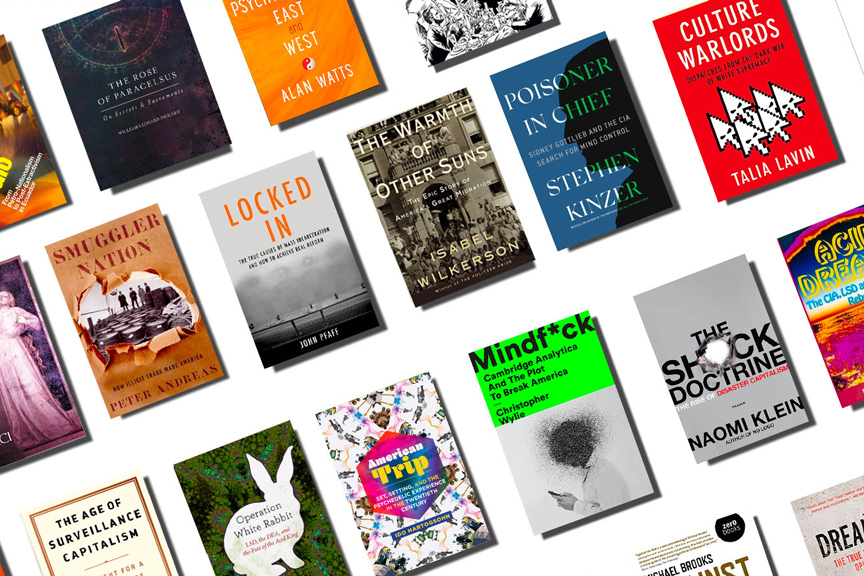
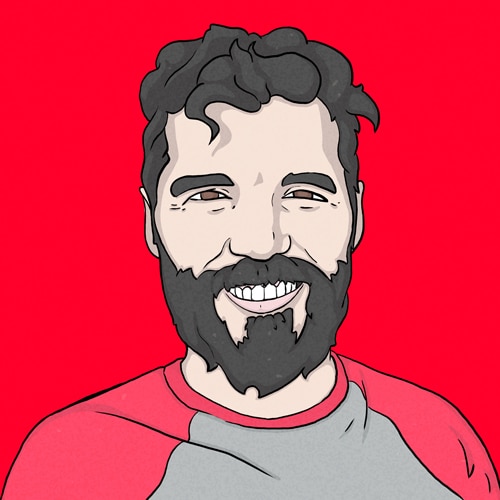
Brian Normand
Founding Editor
#1 Locked In: The True Causes of Mass Incarceration and How To Achieve Real Reform by John Pfaff
#2 The Devils Disciples: Hitler’s Inner Circle by Anthony Read
#3 The Warmth of Other Suns: The Epic Story of America’s Great Migration by Isabel Wilkerson
#4 Smuggler Nation: How Illicit Trade Made America by Peter Andreas
#6 Random Family: Love, Drugs, Trouble, And The Coming Of Age In The Bronx by Adrian Nicole LeBlanc
#7 The Beast: Riding The Rails And Dodging Narcos On The Migrant Trail by Oscar Martinez
#8 El Sicario: The Autobiography Of A Mexican Assassin, edited by Molly Molloy and Charles Bowden
Locked In: The True Causes of Mass Incarceration and How To Achieve Real Reform by John Pfaff
In Locked In, John Pfaff argues that the factors most commonly cited to explain mass incarceration — the failed War on Drugs, draconian sentencing laws, an increasing reliance on private prisons — tell us much less than we think. Instead, Pfaff urges us to look at other factors, especially a major shift in prosecutor behavior that occurred in the mid-1990s, when prosecutors began bringing felony charges against arrestees about twice as often as they had before. An authoritative, clear-eyed account of a national catastrophe, Locked In is “a must-read for anyone who dreams of an America that is not the world’s most imprisoned nation” (Chris Hayes, author of A Colony in a Nation). It transforms our understanding of what ails the American system of punishment and ultimately forces us to reconsider how we can build a more equitable and humane society.
The Devils Disciples: Hitler’s Inner Circle by Anthony Read
The Nazi regime was essentially a religious cult relying on the hypnotic personality of Adolf Hitler, and it was fated to die with him. But while it lasted, his closest lieutenants competed ferociously for power and position as his chosen successor. This peculiar leadership dynamic resulted in millions of deaths and some of the worst excesses of World War II. The Devil’s Disciples is the first major book for a general readership to examine those lieutenants, not only as individuals but also as a group.
The Warmth of Other Suns: The Epic Story of America’s Great Migration by Isabel Wilkerson
In this epic, beautifully written masterwork, Pulitzer Prize–winning author Isabel Wilkerson chronicles one of the great untold stories of American history: the decades-long migration of black citizens who fled the South for northern and western cities, in search of a better life. From 1915 to 1970, this exodus of almost six million people changed the face of America. Wilkerson compares this epic migration to the migrations of other peoples in history. She interviewed more than a thousand people, and gained access to new data and official records, to write this definitive and vividly dramatic account of how these American journeys unfolded, altering our cities, our country, and ourselves.
Smuggler Nation: How Illicit Trade Made America by Peter Andreas
America is a smuggler nation. Our long history of illicit imports has ranged from West Indies molasses and Dutch gunpowder in the 18th century, to British industrial technologies and African slaves in the 19th century, to French condoms and Canadian booze in the early 20th century, to Mexican workers and Colombian cocaine in the modern era. Contraband capitalism, it turns out, has been an integral part of American capitalism. Far from being a new and unprecedented danger to America, the illicit underside of globalization is actually an old American tradition. As Andreas shows, it goes back not just decades but centuries. And its impact has been decidedly double-edged, not only subverting U.S. laws but also helping to fuel America’s evolution from a remote British colony to the world’s pre-eminent superpower.
In this masterwork of original thinking and research, Shoshana Zuboff provides startling insights into the phenomenon that she has named surveillance capitalism. The stakes could not be higher: a global architecture of behavior modification threatens human nature in the twenty-first century just as industrial capitalism disfigured the natural world in the twentieth. The threat has shifted from a totalitarian Big Brother state to a ubiquitous digital architecture: a “Big Other” operating in the interests of surveillance capital. Here is the crucible of an unprecedented form of power marked by extreme concentrations of knowledge and free from democratic oversight. Zuboff’s comprehensive and moving analysis lays bare the threats to twenty-first century society: a controlled “hive” of total connection that seduces with promises of total certainty for maximum profit — at the expense of democracy, freedom, and our human future.
Random Family: Love, Drugs, Trouble, And The Coming Of Age In The Bronx by Adrian Nicole LeBlanc
Random Family tells the American outlaw saga lurking behind the headlines of gangsta glamour, gold-drenched drug dealers, and street-corner society. With an immediacy made possible only after ten years of reporting, Adrian Nicole LeBlanc immerses the reader in the mind-boggling intricacies of the little-known ghetto world. She charts the tumultuous cycle of the generations, as girls become mothers, mothers become grandmothers, boys become criminals, and hope struggles against deprivation. A gifted prose stylist and a profoundly compassionate observer, Adrian Nicole LeBlanc has slipped behind the cold statistics and sensationalism surrounding inner-city life and come back with a riveting, haunting, and true urban soap opera that reveals the clenched grip of the streets. Random Family is a compulsive read and an important journalistic achievement, sure to take its place beside the classics of the genre.
The Beast: Riding The Rails And Dodging Narcos On The Migrant Trail by Oscar Martinez
One day a few years ago, 300 migrants were kidnapped between the remote desert towns of Altar, Mexico, and Sasabe, Arizona. A local priest got 120 released, many with broken ankles and other marks of abuse, but the rest vanished. Óscar Martínez, a young writer from El Salvador, was in Altar soon after the abduction, and his account of the migrant disappearances is only one of the harrowing stories he garnered from two years spent traveling up and down the migrant trail from Central America and across the US border. More than a quarter of a million Central Americans make this increasingly dangerous journey each year, and each year as many as 20,000 of them are kidnapped. Martínez writes in powerful, unforgettable prose about clinging to the tops of freight trains; finding respite, work and hardship in shelters and brothels; and riding shotgun with the border patrol. Illustrated with stunning full-color photographs, The Beast is the first book to shed light on the harsh new reality of the migrant trail in the age of the narcotraficantes.
El Sicario: The Autobiography Of A Mexican Assassin, edited by Molly Molloy and Charles Bowden
In this unprecedented and chilling monologue, a repentant Mexican hitman tells the unvarnished truth about the war on drugs on the American. El Sicario is the hidden face of America’s war on drugs. He is a contract killer who functioned as a commandante in the Chihuahuan State police, who was trained in the US by the FBI, and who for twenty years kidnapped, tortured and murdered people for the drug industry at the behest of Mexican drug cartels. The well-spoken man that emerges from the pages of El Sicario is one who has been groomed by poverty and driven by a refusal to be one more statistic in the failure of Mexico. He speaks as a free man and of his own free will – there are no charges against him. He is a lonely voice – no one with his background has ever come forward and talked. He is the future – there are thousands of men like him in Mexico and there will be more in other places. He is the truth no one wants to hear.

Neşe Devenot
Medicine, Society & Culture Editor
#1 The Rose of Paracelsus: On Secrets and Sacraments by William Leonard Pickard
#2 High Weirdness by Erik Davis
#3 His Dark Materials by Philip Pullman
#4 Psychotherapy East & Westby Alan Watts
#5 The Education of Oversoul Seven by Jane Roberts
#6 A Separate Reality: Further Conversations With Don Juan by Carlos Castaneda
#7 Living a Feminist Life by Sara Ahmed
#8 High Society: Mind-Altering Drugs in History and Culture by Mike Jay
The Rose of Paracelsus: On Secrets and Sacraments by William Leonard Pickard
A Harvard graduate student and researcher explores a global entheogen system, discovering their practices leading to cognitive enhancement and, arguably, the next human form. From Cambridge to Moscow, Oxford to Zürich, Princeton to Mazar-i-Sharif and Bangkok, this journal of research interviews records the lifestyles within a most rare and elusive organization, one that has evolved special gifts: advanced capacities of thought, memory and perception.
A study of the spiritual provocations to be found in the work of Philip K. Dick, Terence McKenna, and Robert Anton Wilson, High Weirdness charts the emergence of a new psychedelic spirituality that arose from the American counterculture of the 1970s. These three authors changed the way millions of readers thought, dreamed, and experienced reality—but how did their writings reflect, as well as shape, the seismic cultural shifts taking place in America?
In High Weirdness, Erik Davis—America’s leading scholar of high strangeness—examines the published and unpublished writings of these vital, iconoclastic thinkers, as well as their own life-changing mystical experiences. Davis explores the complex lattice of the strange that flowed through America’s West Coast at a time of radical technological, political, and social upheaval to present a new theory of the weird as a viable mode for a renewed engagement with reality.
His Dark Materials by Philip Pullman
His Dark Materials is a trilogy of fantasy novels by Philip Pullman consisting of Northern Lights (1995) (published as The Golden Compass in North America), The Subtle Knife (1997), and The Amber Spyglass (2000). It follows the coming of age of two children, Lyra Belacqua and Will Parry, as they wander through a series of parallel universes.
Psychotherapy East & West by Alan Watts
What is the common ground between Western psychiatry and Eastern philosophy, and what has each to learn from the other? Alan Watts found a common principle that, intentionally or otherwise, seems to be used wherever therapy is trying to overcome man’s false sense of himself as an isolated ego — an ego that traps him in a perpetual flight from death and loneliness. In varying ways and degrees, both Eastern philosophy and Western psychotherapy engage the individual in experiments that vividly reveal the fallacy of this conception and give him a new feeling of identity.
The Education of Oversoul Seven by Jane Roberts
Inspired by Jane Roberts’ own experiences as the author of the immensely popular “Seth” books, these three novels — now collected in one volume — are one of the most imaginative tales ever written. Jane Roberts’ beloved character, Oversoul Seven, an ageless student of the universe, explores the entire framework of our existence. As we follow Seven’s education, our own beliefs about life, death, dreams, time and space are challenged and stretched, leaving us with a refreshing and provocative perspective on the true nature of reality.
A Separate Reality: Further Conversations With Don Juan by Carlos Castaneda
“A Separate Reality: Further Conversations With Don Juan” is a book written by anthropologist/author Carlos Castaneda, published in 1971, concerning the events that took place during his apprenticeship with a Yaqui Indian Sorcerer, Don Juan Matus, between 1960 and 1965.
Living a Feminist Life by Sara Ahmed
In “Living a Feminist Life” Sara Ahmed shows how feminist theory is generated from everyday life and the ordinary experiences of being a feminist at home and at work. Building on legacies of feminist of color scholarship in particular, Ahmed offers a poetic and personal meditation on how feminists become estranged from worlds they critique—often by naming and calling attention to problems—and how feminists learn about worlds from their efforts to transform them. Ahmed also provides her most sustained commentary on the figure of the feminist killjoy introduced in her earlier work while showing how feminists create inventive solutions—such as forming support systems—to survive the shattering experiences of facing the walls of racism and sexism. The killjoy survival kit and killjoy manifesto, with which the book concludes, supply practical tools for how to live a feminist life, thereby strengthening the ties between the inventive creation of feminist theory and living a life that sustains it.
High Society: Mind-Altering Drugs in History and Culture by Mike Jay
Mike Jays global history of intoxication looks at the earliest archaeological evidence of drug use, the botanicals of the classical world, the mind-bending self-experiments of early scientists and today’s war on drugs. Every society is a high society. Every day, people drink coffee on European terraces, chew betel nut in Indonesian markets, take coca leaf on Andean mountainsides and smoke tobacco in every nation on earth. This striking and lyrical book, beautifully illustrated with rarely seen paintings, photographs and engravings from the Wellcome Collection, explores the international spectrum of drug use in cultures throughout the modern world: medicines, religious sacraments, status symbols and coveted trade goods. Fascinating and highly recommended Psychedelic Press Straightforward and engaging storytelling and cool headed analysis of use of, and attitudes towards, mind-altering drugs deserves high praise for rendering a complex, controversial topic with clarity and elegance.

David Nickles
Managing Editor
#1 The Age of Surveillance Capitalism: The Fight For A Human Future At The New Frontier of Power by Shoshana Zuboff
#2 My Life in the Black Panther Party by Field Marshal Don Cox
#3 Operation White Rabbit: LSD, the DEA, and the Fate of the Acid King by Dennis McDougal
#4 No Wall They Can Build by Crimethinc
#6 This Changes Everything: Capitalism vs. The Climate by Naomi Klein
#7 Dreamland: The True Tale of America’s Opiate Epidemic by Sam Quinones
#8 Against the Web: A Cosmopolitan Answer to the Right by Michael Brooks
The Age of Surveillance Capitalism: The Fight For A Human Future At The New Frontier of Power by Shoshana Zuboff
In this masterwork of original thinking and research, Shoshana Zuboff provides startling insights into the phenomenon that she has named surveillance capitalism. The stakes could not be higher: a global architecture of behavior modification threatens human nature in the twenty-first century just as industrial capitalism disfigured the natural world in the twentieth.
The threat has shifted from a totalitarian Big Brother state to a ubiquitous digital architecture: a “Big Other” operating in the interests of surveillance capital. Here is the crucible of an unprecedented form of power marked by extreme concentrations of knowledge and free from democratic oversight. Zuboff’s comprehensive and moving analysis lays bare the threats to twenty-first century society: a controlled “hive” of total connection that seduces with promises of total certainty for maximum profit — at the expense of democracy, freedom, and our human future.
Just Another Nigger: My Life in the Black Panther Party by Field Marshal Don Cox
“Just Another Nigger” is Don Cox’s revelatory, even incendiary account of his years in the Black Panther Party. He participated in many peaceful Bay Area civil rights protests but hungered for more militant action. His book tells the story of his work as the party’s field marshal in charge of gunrunning to planning armed attacks—tales which are told for the first time in this remarkable memoir—to his star turn raising money at the Manhattan home of Leonard Bernstein (for which he was famously mocked by Tom Wolfe in Radical Chic and Mau-Mauing the Flak Catchers), to his subsequent flight to Algeria to join Eldridge Cleaver in exile, to his decision to leave the party following his disillusionment with Huey P. Newton’s leadership. Cox would live out the rest of his life in self-imposed exile, where he began writing these unrepentant recollections in the early 1980s, enjoining his daughter to promise him that she would do everything she could to have them published—with the title he insisted upon, a nod to W. E. B. Du Bois’s remark that “In my own country, for nearly a century I have been nothing but a nigger.”
Operation White Rabbit: LSD, the DEA, and the Fate of the Acid King by Dennis McDougal
A search for the truth behind the DEA’s life imprisonment of acid’s most famous martyr. “Operation White Rabbit” traces the rise and fall—and rise and fall again—of the psychedelic community through the life of the man known as the “Acid King:” William Leonard Pickard. Pickard was a legitimate genius, a follower of Timothy Leary, a con artist, a womanizer, and a believer that LSD would save lives. He was a foreign diplomat, a Harvard fellow, and the biggest producer of LSD on the planet—if you believe the DEA.
No Wall They Can Build by Crimethinc
In riveting first-person narrative, No Wall They Can Build offers a close look at the borders that control movement around North America. Drawing on a decade of solidarity work in the desert between Mexico and Arizona, this book uncovers the goals and costs of US border policy, and what it will take to change it.
Drawing on insights from the study of science, technology, and society, Ido Hartogsohn develops the idea of LSD as a suggestible technology, the properties of which are shaped by suggestion. He proposes the concept of collective set and setting, arguing that the historical and sociocultural context of midcentury America offered a particular set and setting—creating the conditions for what he calls the American trip.
This Changes Everything: Capitalism vs. The Climate by Naomi Klein
In This Changes Everything Naomi Klein argues that climate change isn’t just another issue to be neatly filed between taxes and health care. It’s an alarm that calls us to fix an economic system that is already failing us in many ways. Klein meticulously builds the case for how massively reducing our greenhouse emissions is our best chance to simultaneously reduce gaping inequalities, re-imagine our broken democracies, and rebuild our gutted local economies. She exposes the ideological desperation of the climate-change deniers, the messianic delusions of the would-be geoengineers, and the tragic defeatism of too many mainstream green initiatives. And she demonstrates precisely why the market has not—and cannot—fix the climate crisis but will instead make things worse, with ever more extreme and ecologically damaging extraction methods, accompanied by rampant disaster capitalism.
Klein argues that the changes to our relationship with nature and one another that are required to respond to the climate crisis humanely should not be viewed as grim penance, but rather as a kind of gift—a catalyst to transform broken economic and cultural priorities and to heal long-festering historical wounds. And she documents the inspiring movements that have already begun this process: communities that are not just refusing to be sites of further fossil fuel extraction but are building the next, regeneration-based economies right now.
Can we pull off these changes in time? Nothing is certain. Nothing except that climate change changes everything. And for a very brief time, the nature of that change is still up to us.
Dreamland: The True Tale of America’s Opiate Epidemic by Sam Quinones
With a great reporter’s narrative skill and the storytelling ability of a novelist, acclaimed journalist Sam Quinones weaves together two classic tales of capitalism run amok whose unintentional collision has been catastrophic. The unfettered prescribing of pain medications during the 1990s reached its peak in Purdue Pharma’s campaign to market OxyContin, its new, expensive–extremely addictive–miracle painkiller. Meanwhile, a massive influx of black tar heroin–cheap, potent, and originating from one small county on Mexico’s west coast, independent of any drug cartel–assaulted small town and mid-sized cities across the country, driven by a brilliant, almost unbeatable marketing and distribution system. Together these phenomena continue to lay waste to communities from Tennessee to Oregon, Indiana to New Mexico.
Against the Web: A Cosmopolitan Answer to the Right by Michael Brooks
Michael Brooks takes on the new “Intellectual Dark Web.” As the host of The Michael Brooks Show and co-host of the Majority Report, he lets his understanding of the new media environment direct his analysis of the newly risen conservative rebels who have taken YouTube by storm. Brooks provides a theoretically rigorous but accessible critique of the most prominent “renegades” including Sam Harris, Jordan Peterson, and Brett Weinstein while also examining the social, political and media environment that these rebels thrive in.

Lily Kay Ross
Arts and Gender Editor
#1 The First Bad Man by Miranda July
#2 Savage Appetites: Four True Stories of Women, Crime, and Obsession by Rachel Monroe
#3 Desert Notebooks: A Road Map for the End of Time by Ben Ehrenreich
#4 The Overstory by Richard Powers
#5 The Warmth of Other Suns: The Epic Story of America’s Great Migration by Isabel Wilkerson
#6 Sing, Unburied, Sing by Jesmyn Ward
The First Bad Man by Miranda July
Cheryl Glickman believes in romances that span centuries and a soul that migrates between babies. She works at a women’s self-defense nonprofit and lives alone. When her bosses ask if their twenty-year-old daughter, Clee, can move into her house for a while, Cheryl’s eccentrically ordered world explodes. And yet it is Clee—the selfish, cruel blond bombshell—who bullies Cheryl into reality and, unexpectedly, leads her to the love of a lifetime.
Tender, gripping, slyly hilarious, infused with raging sexual fantasies and fierce maternal love, Miranda July’s first novel confirms her as a spectacularly original, iconic, and important voice today, and a writer for all time.
Savage Appetites: Four True Stories of Women, Crime, and Obsession by Rachel Monroe
In this illuminating exploration of women, violence, and obsession, Rachel Monroe interrogates the appeal of true crime through four narratives of fixation. In the 1940s, a frustrated heiress began creating dollhouse crime scenes depicting murders, suicides, and accidental deaths. Known as the “Mother of Forensic Science,” she revolutionized the field of what was then called legal medicine. In the aftermath of the Manson Family murders, a young woman moved into Sharon Tate’s guesthouse and, over the next two decades, entwined herself with the Tate family. In the mid-nineties, a landscape architect in Brooklyn fell in love with a convicted murderer, the supposed ringleader of the West Memphis Three, through an intense series of letters. After they married, she devoted her life to getting him freed from death row. And in 2015, a teenager deeply involved in the online fandom for the Columbine killers planned a mass shooting of her own.
Each woman, Monroe argues, represents and identifies with a particular archetype that provides an entryway into true crime. Through these four cases, she traces the history of American crime through the growth of forensic science, the evolving role of victims, the Satanic Panic, the rise of online detectives, and the long shadow of the Columbine shooting. In a combination of personal narrative, reportage, and a sociological examination of violence and media in the twentieth and twenty-first century, Savage Appetites scrupulously explores empathy, justice, and the persistent appeal of violence.
Desert Notebooks: A Road Map for the End of Time by Ben Ehrenreich
Desert Notebooks examines how the unprecedented pace of destruction to our environment and an increasingly unstable geopolitical landscape have led us to the brink of a calamity greater than any humankind has confronted before. As inhabitants of the Anthropocene, what might some of our own histories tell us about how to confront apocalypse? And how might the geologies and ecologies of desert spaces inform how we see and act toward time―the pasts we have erased and paved over, this anxious present, the future we have no choice but to build? Ehrenreich draws on the stark grandeur of the desert to ask how we might reckon with the uncertainty that surrounds us and fight off the crises that have already begun.
In the canyons and oases of the Mojave and in Las Vegas’s neon apocalypse, Ehrenreich finds beauty, and even hope, surging up in the most unlikely places, from the most barren rocks, and the apparent emptiness of the sky. Desert Notebooks is a vital and necessary chronicle of our past and our present―unflinching, urgent―yet timeless and profound.
The Overstory by Richard Powers
The Overstory, winner of the 2019 Pulitzer Prize in Fiction, is a sweeping, impassioned work of activism and resistance that is also a stunning evocation of―and paean to―the natural world. From the roots to the crown and back to the seeds, Richard Powers’s twelfth novel unfolds in concentric rings of interlocking fables that range from antebellum New York to the late twentieth-century Timber Wars of the Pacific Northwest and beyond. There is a world alongside ours―vast, slow, interconnected, resourceful, magnificently inventive, and almost invisible to us. This is the story of a handful of people who learn how to see that world and who are drawn up into its unfolding catastrophe.
The Warmth of Other Suns: The Epic Story of America’s Great Migration by Isabel Wilkerson
From 1915 to 1970, this exodus of almost six million people changed the face of America. Wilkerson compares this epic migration to the migrations of other peoples in history. She interviewed more than a thousand people, and gained access to new data and official records, to write this definitive and vividly dramatic account of how these American journeys unfolded, altering our cities, our country, and ourselves.
With stunning historical detail, Wilkerson tells this story through the lives of three unique individuals: Ida Mae Gladney, who in 1937 left sharecropping and prejudice in Mississippi for Chicago, where she achieved quiet blue-collar success and, in old age, voted for Barack Obama when he ran for an Illinois Senate seat; sharp and quick-tempered George Starling, who in 1945 fled Florida for Harlem, where he endangered his job fighting for civil rights, saw his family fall, and finally found peace in God; and Robert Foster, who left Louisiana in 1953 to pursue a medical career, the personal physician to Ray Charles as part of a glitteringly successful medical career, which allowed him to purchase a grand home where he often threw exuberant parties.
Wilkerson brilliantly captures their first treacherous and exhausting cross-country trips by car and train and their new lives in colonies that grew into ghettos, as well as how they changed these cities with southern food, faith, and culture and improved them with discipline, drive, and hard work. Both a riveting microcosm and a major assessment, The Warmth of Other Suns is a bold, remarkable, and riveting work, a superb account of an “unrecognized immigration” within our own land. Through the breadth of its narrative, the beauty of the writing, the depth of its research, and the fullness of the people and lives portrayed herein, this book is destined to become a classic.
Sing, Unburied, Sing by Jesmyn Ward
Jesmyn Ward’s historic second National Book Award–winner is “perfectly poised for the moment” (The New York Times), an intimate portrait of three generations of a family and an epic tale of hope and struggle. “Ward’s writing throbs with life, grief, and love… this book is the kind that makes you ache to return to it” (Buzzfeed).
Jojo is thirteen years old and trying to understand what it means to be a man. He doesn’t lack in fathers to study, chief among them his Black grandfather, Pop. But there are other men who complicate his understanding: his absent White father, Michael, who is being released from prison; his absent White grandfather, Big Joseph, who won’t acknowledge his existence; and the memories of his dead uncle, Given, who died as a teenager.
His mother, Leonie, is an inconsistent presence in his and his toddler sister’s lives. She is an imperfect mother in constant conflict with herself and those around her. She is Black and her children’s father is White. She wants to be a better mother but can’t put her children above her own needs, especially her drug use. Simultaneously tormented and comforted by visions of her dead brother, which only come to her when she’s high, Leonie is embattled in ways that reflect the brutal reality of her circumstances.
When the children’s father is released from prison, Leonie packs her kids and a friend into her car and drives north to the heart of Mississippi and Parchman Farm, the State Penitentiary. At Parchman, there is another thirteen-year-old boy, the ghost of a dead inmate who carries all of the ugly history of the South with him in his wandering. He too has something to teach Jojo about fathers and sons, about legacies, about violence, about love.
The Thing Around Your Neck by Chimamanda Ngozi Adichie
In these twelve riveting stories, the award-winning Chimamanda Ngozi Adichie explores the ties that bind men and women, parents and children, Africa and the United States. Searing and profound, suffused with beauty, sorrow, and longing, these stories map, with Adichie’s signature emotional wisdom, the collision of two cultures and the deeply human struggle to reconcile them.
My Year of Rest and Relaxation by Ottessa Moshfegh
From one of our boldest, most celebrated new literary voices, a novel about a young woman’s efforts to duck the ills of the world by embarking on an extended hibernation with the help of one of the worst psychiatrists in the annals of literature and the battery of medicines she prescribes.
Our narrator should be happy, shouldn’t she? She’s young, thin, pretty, a recent Columbia graduate, works an easy job at a hip art gallery, lives in an apartment on the Upper East Side of Manhattan paid for, like the rest of her needs, by her inheritance. But there is a dark and vacuous hole in her heart, and it isn’t just the loss of her parents, or the way her Wall Street boyfriend treats her, or her sadomasochistic relationship with her best friend, Reva. It’s the year 2000 in a city aglitter with wealth and possibility; what could be so terribly wrong?
My Year of Rest and Relaxation is a powerful answer to that question. Through the story of a year spent under the influence of a truly mad combination of drugs designed to heal our heroine from her alienation from this world, Moshfegh shows us how reasonable, even necessary, alienation can be. Both tender and blackly funny, merciless and compassionate, it is a showcase for the gifts of one of our major writers working at the height of her powers.

Brian Pace
Politics and Ecology Editor
#1 Caliban and the Witch: Women, The Body And Primitive Accumulation by Silvia Federici
#2 Culture Warlords: My Journey Into the Dark Web of White Supremacy by Talia Lavin
#3 Poisoner in Chief: Sidney Gottlieb and the CIA Search for Mind Control by Stephen Kinzer
#4 The Utopia of Rules: On Technology, Stupidity, and the Secret Joys of Bureaucracy by David Graeber
#5 Against the Web: A Cosmopolitan Answer to the New Right by Michael Brooks
#6 Winners Take All: The Elite Charade of Changing the World by Anand Giridharadas
#8 Capitalist Realism: Is There No Alternative? by Mark Fisher
Caliban and the Witch: Women, The Body And Primitive Accumulation by Silvia Federici
Caliban and the Witch is a history of the body in the transition to capitalism. Moving from the peasant revolts of the late Middle Ages to the witch-hunts and the rise of mechanical philosophy, Federici investigates the capitalist rationalization of social reproduction. She shows how the battle against the rebel body and mind are essential conditions for the development of labor power and self-ownership, two central principles of modern social organization.
Culture Warlords: My Journey Into the Dark Web of White Supremacy by Talia Lavin
Culture Warlords is the story of how Lavin, a frequent target of extremist trolls (including those at Fox News), dove into a byzantine online culture of hate and learned the intricacies of how white supremacy proliferates online. Within these pages, she reveals the extremists hiding in plain sight online: Incels. White nationalists. White supremacists. National Socialists. Proud Boys. Christian extremists. In order to showcase them in their natural habitat, Talia assumes a range of identities, going undercover as a blonde Nazi babe, a forlorn incel, and a violent Aryan femme fatale. Along the way, she discovers a whites-only dating site geared toward racists looking for love, a disturbing extremist YouTube channel run by a fourteen-year-old girl with over 800,000 followers, the everyday heroes of the antifascist movement, and much more. By combining compelling stories chock-full of catfishing and gate-crashing with her own in-depth, gut-wrenching research, she also turns the lens of anti-Semitism, racism, and white power back on itself in an attempt to dismantle and decimate the online hate movement from within.
Poisoner in Chief: Sidney Gottlieb and the CIA Search for Mind Control by Stephen Kinzer
The visionary chemist Sidney Gottlieb was the CIA’s master magician and gentlehearted torturer—the agency’s “poisoner in chief.” As head of the MK-ULTRA mind control project, he directed brutal experiments at secret prisons on three continents. He made pills, powders, and potions that could kill or maim without a trace—including some intended for Fidel Castro and other foreign leaders. He paid prostitutes to lure clients to CIA-run bordellos, where they were secretly dosed with mind-altering drugs. His experiments spread LSD across the United States, making him a hidden godfather of the 1960s counterculture. For years he was the chief supplier of spy tools used by CIA officers around the world.
The Utopia of Rules: On Technology, Stupidity, and the Secret Joys of Bureaucracy by David Graeber
Where does the desire for endless rules, regulations, and bureaucracy come from? How did we come to spend so much of our time filling out forms? And is it really a cipher for state violence? To answer these questions, the anthropologist David Graeber—one of our most important and provocative thinkers—traces the peculiar and unexpected ways we relate to bureaucracy today, and reveals how it shapes our lives in ways we may not even notice…though he also suggests that there may be something perversely appealing—even romantic—about bureaucracy. Leaping from the ascendance of right-wing economics to the hidden meanings behind Sherlock Holmes and Batman, The Utopia of Rules is at once a powerful work of social theory in the tradition of Foucault and Marx, and an entertaining reckoning with popular culture that calls to mind Slavoj Zizek at his most accessible.
Against the Web: A Cosmopolitan Answer to the New Right by Michael Brooks
“A brilliant critique of the Right with very sharp insight on some of the shortcomings of the Left, this book is a must-read for anyone looking to understand how dishonest actors spread their propaganda.” Ana Kasparian, Host and Executive Producer of The Young Turks Michael Brooks takes on the new “Intellectual Dark Web.” As the host of The Michael Brooks Show and co-host of the Majority Report, Brooks was a progressive fighter whose work brought people together from around the world. In this, his first book, he lets his understanding of the digital media environment direct his analysis of the “conservative rebels” who had taken YouTube by storm in 2018. Brooks provides a theoretically rigorous but accessible critique of the most prominent “renegades” including Sam Harris, Jordan Peterson, and Brett Weinstein while also examining the social, political and media environment that such rebels thrive in.
Winners Take All: The Elite Charade of Changing the World by Anand Giridharadas
Former New York Times columnist Anand Giridharadas takes us into the inner sanctums of a new gilded age, where the rich and powerful fight for equality and justice any way they can–except ways that threaten the social order and their position atop it. We see how they rebrand themselves as saviors of the poor; how they lavishly reward “thought leaders” who redefine “change” in winner-friendly ways; and how they constantly seek to do more good, but never less harm. We hear the limousine confessions of a celebrated foundation boss; witness an American president hem and haw about his plutocratic benefactors; and attend a cruise-ship conference where entrepreneurs celebrate their own self-interested magnanimity.
Giridharadas asks hard questions: Why, for example, should our gravest problems be solved by the unelected upper crust instead of the public institutions it erodes by lobbying and dodging taxes? He also points toward an answer: Rather than rely on scraps from the winners, we must take on the grueling democratic work of building more robust, egalitarian institutions and truly changing the world. A call to action for elites and everyday citizens alike.
Are psychedelics invaluable therapeutic medicines, or dangerously unpredictable drugs that precipitate psychosis? Tools for spiritual communion or cognitive enhancers that spark innovation? Activators for one’s private muse or part of a political movement? In the 1950s and 1960s, researchers studied psychedelics in all these incarnations, often arriving at contradictory results. In American Trip, Ido Hartogsohn examines how the psychedelic experience in midcentury America was shaped by historical, social, and cultural forces—by set (the mindset of the user) and setting (the environments in which the experience takes place). He explores uses of psychedelics that range from CIA and military experimentation to psychedelic-inspired styles in music, fashion, design, architecture, and film. Along the way, he introduces us to a memorable cast of characters including Betty Eisner, a psychologist who drew on her own experience to argue for the therapeutic potential of LSD, and Timothy Leary, who founded the Harvard Psilocybin Project and went on to become psychedelics’ most famous advocate.
Hartogsohn chronicles these developments in the context of the era’s cultural trends, including the cold war, the counterculture, the anti-psychiatric movement, and the rise of cybernetics. Drawing on insights from the study of science, technology, and society, he develops the idea of LSD as a suggestible technology, the properties of which are shaped by suggestion. He proposes the concept of collective set and setting, arguing that the historical and sociocultural context of midcentury America offered a particular set and setting—creating the conditions for what he calls the American trip.
Capitalist Realism: Is There No Alternative? by Mark Fisher
After 1989, capitalism has successfully presented itself as the only realistic political-economic system – a situation that the bank crisis of 2008, far from ending, actually compounded. The book analyses the development and principal features of this capitalist realism as a lived ideological framework. Using examples from politics, films, fiction, work and education, it argues that capitalist realism colours all areas of contemporary experience. But it will also show that, because of a number of inconsistencies and glitches internal to the capitalist reality program capitalism in fact is anything but realistic.
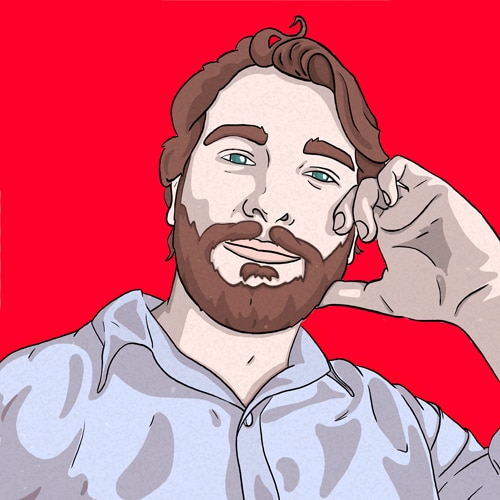
Russell Hausfeld
Senior Writer
#1 Operation White Rabbit: LSD, the DEA, and the Fate of the Acid King by Dennis McDougal
#2 The Shock Doctrine: The Rise of Disaster Capitalism by Naomi Klein
#3 Verax: The True History of Whistleblowers, Drone Warfare, and Mass Surveillance by Khalil and Pratap Chatterjee
#4 Out of the Ooze: The Story of Dr. Tom Price by Alexander Zaitchik
#5 Acid Dreams: The Complete Social History of LSD by Martin A. Lee
#7 Saga by Brian K. Vaughan and Fiona Staples
#8 Resource Radicals: From Petro-Nationalism to Post-Extractivism in Ecuador by Thea Riofrancos
Operation White Rabbit: LSD, the DEA, and the Fate of the Acid King by Dennis McDougal
A search for the truth behind the DEA’s life imprisonment of acid’s most famous martyr. “Operation White Rabbit” traces the rise and fall—and rise and fall again—of the psychedelic community through the life of the man known as the “Acid King:” William Leonard Pickard. Pickard was a legitimate genius, a follower of Timothy Leary, a con artist, a womanizer, and a believer that LSD would save lives. He was a foreign diplomat, a Harvard fellow, and the biggest producer of LSD on the planet—if you believe the DEA.
The Shock Doctrine: The Rise of Disaster Capitalism by Naomi Klein
In this groundbreaking alternative history of the most dominant ideology of our time, Milton Friedman’s free-market economic revolution, Naomi Klein challenges the popular myth of this movement’s peaceful global victory. From Chile in 1973 to Iraq today, Klein shows how Friedman and his followers have repeatedly harnessed terrible shocks and violence to implement their radical policies.
Verax: The True History of Whistleblowers, Drone Warfare, and Mass Surveillance by Khalil and Pratap Chatterjee
9/11 not only marked the worst domestic terror attack in U.S. history, but also unleashed electronic spying by the government on a massive worldwide scale. In a wholly original and engaging telling, “Verax” (“truth-teller” and one of Edward Snowden’s code names) recounts the full story of American electronic surveillance post 9/11, in brilliant comics form.
Out of the Ooze: The Story of Dr. Tom Price by Alexander Zaitchik
In “Out of the Ooze,” journalist Alexander Zaitchik sketches the arc of Dr. Tom Price’s career, from his days as a young flack for the American Medical Association barnstorming Georgia in opposition to the Clinton reform push of 1993; to his years on the Ways and Means Committee, when he brazenly traded $300,000 worth of healthcare-related stocks while lobbying on behalf of those same companies; to his current position at the apex of healthcare policy and GOP strategy to roll back the moderate reforms of the previous administration. The result is a taut argument for both the criminal investigation of Tom Price and a radical overhaul of the U.S. healthcare system he now oversees.
Acid Dreams: The Complete Social History of LSD by Martin A. Lee
“Acid Dreams” is a complete social history of the psychedelic counter-culture that burst into full view in the Sixties. With new information obtained through the Freedom of Information Act, the authors reveal how the CIA became obsessed with LSD during the Cold War, fearing the Soviets had designs on it as well. The story took a new turn when Captain Al Hubbard, the first of a series of “Johnny Appleseeds” of acid, began to turn on thousands of scientists, businessmen, church figures, policemen, and others from different walks of life. And, “Acid Dreams” follows as the anti-war movement ramped up in the Sixties, acid intensifying each stage of counter-cultural transition to break the “mind-forged manacles” of a new generation in rebellion.
In this masterwork of original thinking and research, Shoshana Zuboff provides startling insights into the phenomenon that she has named surveillance capitalism. The stakes could not be higher: a global architecture of behavior modification threatens human nature in the twenty-first century just as industrial capitalism disfigured the natural world in the twentieth.
The threat has shifted from a totalitarian Big Brother state to a ubiquitous digital architecture: a “Big Other” operating in the interests of surveillance capital. Here is the crucible of an unprecedented form of power marked by extreme concentrations of knowledge and free from democratic oversight. Zuboff’s comprehensive and moving analysis lays bare the threats to twenty-first century society: a controlled “hive” of total connection that seduces with promises of total certainty for maximum profit — at the expense of democracy, freedom, and our human future.
Saga by Brian K. Vaughan and Fiona Staples
“Saga” is an epic space opera/fantasy comic book series created by writer Brian K. Vaughan and artist Fiona Staples, published monthly by Image Comics. The series is heavily influenced by Star Wars, and based on ideas Vaughan conceived both as a child and as a parent. It depicts two lovers from long-warring extraterrestrial races, Alana and Marko, fleeing authorities from both sides of a galactic war as they struggle to care for their newborn daughter, Hazel.
Resource Radicals: From Petro-Nationalism to Post-Extractivism in Ecuador by Thea Riofrancos
In “Resource Radicals,” Thea Riofrancos unpacks the conflict between two leftisms: on the one hand, the administration in Ecuador’s resource nationalism and focus on economic development; and on the other, the anti-extractivism of grassroots activists who condemned the government’s disregard for nature and indigenous communities. In this archival and ethnographic study, Riofrancos expands the study of resource politics by decentering state resource policy and locating it in a field of political struggle populated by actors with conflicting visions of resource extraction. She demonstrates how Ecuador’s commodity-dependent economy and history of indigenous uprisings offer a unique opportunity to understand development, democracy, and the ecological foundations of global capitalism.
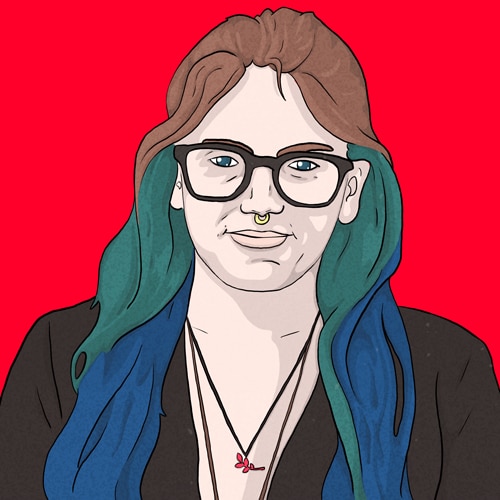
Erica Darragh
Contributor
#1 How to Be an Anti-Racist by Ibram X. Kendi
#4 Mindf*ck: Cambridge Analytica and the Plot to Break America by Christopher Wylie
#5 Race After Technology: Abolitionist Tools for the New Jim Code by Ruha Benjamin
#6 Emergent Strategy: Shaping Change, Changing Worlds by adrienne maree brown
#7 The Politics of Trauma: Somatics, Healing, and Social Justice by Staci Haines
#8 Winning the Green New Deal: Why We Must, How We Can by Varshini Prakash
How to Be an Anti-Racist by Ibram X. Kendi
Antiracism is a transformative concept that reorients and reenergizes the conversation about racism—and, even more fundamentally, points us toward liberating new ways of thinking about ourselves and each other. At its core, racism is a powerful system that creates false hierarchies of human value; its warped logic extends beyond race, from the way we regard people of different ethnicities or skin colors to the way we treat people of different sexes, gender identities, and body types. Racism intersects with class and culture and geography and even changes the way we see and value ourselves. In How to Be an Antiracist, Kendi takes readers through a widening circle of antiracist ideas—from the most basic concepts to visionary possibilities—that will help readers see all forms of racism clearly, understand their poisonous consequences, and work to oppose them in our systems and in ourselves.
Kendi weaves an electrifying combination of ethics, history, law, and science with his own personal story of awakening to antiracism. This is an essential work for anyone who wants to go beyond the awareness of racism to the next step: contributing to the formation of a just and equitable society.
In this masterwork of original thinking and research, Shoshana Zuboff provides startling insights into the phenomenon that she has named surveillance capitalism. The stakes could not be higher: a global architecture of behavior modification threatens human nature in the twenty-first century just as industrial capitalism disfigured the natural world in the twentieth.
The threat has shifted from a totalitarian Big Brother state to a ubiquitous digital architecture: a “Big Other” operating in the interests of surveillance capital. Here is the crucible of an unprecedented form of power marked by extreme concentrations of knowledge and free from democratic oversight. Zuboff’s comprehensive and moving analysis lays bare the threats to twenty-first century society: a controlled “hive” of total connection that seduces with promises of total certainty for maximum profit — at the expense of democracy, freedom, and our human future.
From protests around climate change and immigrant rights, to Occupy, the Arab Spring, and #BlackLivesMatter, a new generation is unleashing strategic nonviolent action to shape public debate and force political change. When mass movements erupt onto our television screens, the media consistently portrays them as being spontaneous and unpredictable. Yet, in this book, Mark and Paul Engler look at the hidden art behind such outbursts of protest, examining core principles that have been used to spark and guide moments of transformative unrest.
With incisive insights from contemporary activists, as well as fresh revelations about the work of groundbreaking figures such as Gandhi, Martin Luther King Jr., Gene Sharp, and Frances Fox Piven, the Englers show how people with few resources and little conventional influence are engineering the upheavals that are reshaping contemporary politics.
Nonviolence is usually seen simply as a philosophy or moral code. This Is an Uprising shows how it can instead be deployed as a method of political conflict, disruption, and escalation. It argues that if we are always taken by surprise by dramatic outbreaks of revolt, we pass up the chance to truly understand how social transformation happens.
Mindf*ck: Cambridge Analytica and the Plot to Break America by Christopher Wylie
Mindf*ck goes deep inside Cambridge Analytica’s “American operations,” which were driven by Steve Bannon’s vision to remake America and fueled by mysterious billionaire Robert Mercer’s money, as it weaponized and wielded the massive store of data it had harvested on individuals—in excess of 87 million—to disunite the United States and set Americans against each other. Bannon had long sensed that deep within America’s soul lurked an explosive tension.
Race After Technology: Abolitionist Tools for the New Jim Code by Ruha Benjamin
From everyday apps to complex algorithms, Ruha Benjamin cuts through tech-industry hype to understand how emerging technologies can reinforce White supremacy and deepen social inequity.
Benjamin argues that automation, far from being a sinister story of racist programmers scheming on the dark web, has the potential to hide, speed up, and deepen discrimination while appearing neutral and even benevolent when compared to the racism of a previous era. Presenting the concept of the “New Jim Code,” she shows how a range of discriminatory designs encode inequity by explicitly amplifying racial hierarchies; by ignoring but thereby replicating social divisions; or by aiming to fix racial bias but ultimately doing quite the opposite. Moreover, she makes a compelling case for race itself as a kind of technology, designed to stratify and sanctify social injustice in the architecture of everyday life.
This illuminating guide provides conceptual tools for decoding tech promises with sociologically informed skepticism. In doing so, it challenges us to question not only the technologies we are sold but also the ones we ourselves manufacture.
Emergent Strategy: Shaping Change, Changing Worlds by adrienne maree brown
Inspired by Octavia Butler’s explorations of our human relationship to change, Emergent Strategy is radical self-help, society-help, and planet-help designed to shape the futures we want to live. Change is constant. The world is in a continual state of flux. It is a stream of ever-mutating, emergent patterns. Rather than steel ourselves against such change, this book invites us to feel, map, assess, and learn from the swirling patterns around us in order to better understand and influence them as they happen. This is a resolutely materialist “spirituality” based equally on science and science fiction, a visionary incantation to transform that which ultimately transforms us.
The Politics of Trauma: Somatics, Healing, and Social Justice by Staci Haines
The Politics of Trauma offers somatics with a social analysis. This book is for therapists and social activists who understand that trauma healing is not just for individuals–and that social change is not just for movement builders. Just as health practitioners need to consider the societal factors underlying trauma, so too must activists understand the physical and mental impacts of trauma on their own lives and the lives of the communities with whom they organize. Trauma healing and social change are, at their best, interdependent. Somatics has proven to be particularly effective in addressing trauma, but in practice it typically focuses solely on the individual, failing to integrate the social conditions that create trauma in the first place. Staci K. Haines, somatic innovator and cofounder of generative somatics, invites readers to look beyond individual experiences of body and mind to examine the social, political, and economic roots of trauma–including racism, environmental degradation, sexism, and poverty. Haines helps readers identify, understand, and address these sources of trauma to help us bridge individual healing with social transformation.
Winning the Green New Deal: Why We Must, How We Can by Varshini Prakash
In Winning a Green New Deal, leading youth activists, journalists, and policymakers explain why we need a transformative agenda to avert climate catastrophe, and how our movement can organize to win. Featuring essays by Varshini Prakash, cofounder of Sunrise Movement; Rhiana Gunn-Wright, Green New Deal policy architect; Joseph Stiglitz, Nobel Prize–winning economist; Bill McKibben, internationally renowned environmentalist; Mary Kay Henry, the President of the Service Employees International Union, and others we’ll learn why the climate crisis cannot be solved unless we also confront inequality and racism, how movements can redefine what’s politically possible and overcome the opposition of fossil fuel billionaires, and how a Green New Deal will build a just and thriving economy for all of us.
For anyone looking to understand the movement for a Green New Deal, and join the fight for a livable future, there is no resource as clear and practical as Winning the Green New Deal.

Matt Payne
Podcast Editor
#1 Surveillance Valley: The Secret Military History of the Internet by Yasha Levine
#3 Don Quixote by Miguel De Cervantes Saavedra
#4 The Code Book: The Science of Secrecy from Ancient Egypt to Quantum Cryptography by Simon Singh
#5 1493: Uncovering the New World Columbus Created by Charles C. Mann
#6 Notes from Underground by Fyodor Dostoevsky
#7 I Contain Multitudes: The Microbes Within Us and a Grander View of Life by Ed Yong
Surveillance Valley: The Secret Military History of the Internet by Yasha Levine
Investigative reporter Yasha Levine uncovers the secret origins of the internet, tracing it back to a Pentagon counterinsurgency surveillance project. With deep research, skilled storytelling, and provocative arguments, Surveillance Valley will change the way you think about the news — and the device on which you read it.
In the Management of Savagery, Max Blumenthal excavates the real story behind America’s dealings with the world and shows how the extremist forces that now threaten peace across the globe are the inevitable flowering of America’s imperial designs.
Washington’s secret funding of the mujahedin provoked the Russian invasion of Afghanistan in 1979. With guns and money, the United States has ever since sustained the extremists, including Osama Bin Laden, who have become its enemies. The Pentagon has trained and armed jihadist elements in Afghanistan, Syria, and Libya; it has launched military interventions to change regimes in the Middle East. In doing so, it created fertile ground for the Islamic State and brought foreign conflicts home to American soil.
These failed wars abroad have made the United States more vulnerable to both terrorism as well as native ultra-nationalism. The Trump presidency is the inevitable consequence of neoconservative imperialism in the post–Cold War age. Trump’s dealings in the Middle East are likely only to exacerbate the situation.
Don Quixote by Miguel De Cervantes Saavedra
Don Quixote has become so entranced reading tales of chivalry that he decides to turn knight errant himself. In the company of his faithful squire, Sancho Panza, these exploits blossom in all sorts of wonderful ways. While Quixote’s fancy often leads him astray—he tilts at windmills, imagining them to be giants—Sancho acquires cunning and a certain sagacity. Sane madman and wise fool, they roam the world together-and together they have haunted readers’ imaginations for nearly four hundred years.
With its experimental form and literary playfulness, Don Quixote has been generally recognized as the first modern novel. This Penguin Classics edition, with its beautiful new cover design, includes John Rutherford’s masterly translation, which does full justice to the energy and wit of Cervantes’s prose, as well as a brilliant critical introduction by Roberto Gonzalez Echevarriá.
The Code Book: The Science of Secrecy from Ancient Egypt to Quantum Cryptography by Simon Singh
Simon Singh offers the first sweeping history of encryption, tracing its evolution and revealing the dramatic effects codes have had on wars, nations, and individual lives. From Mary, Queen of Scots, trapped by her own code, to the Navajo Code Talkers who helped the Allies win World War II, to the incredible (and incredibly simple) logisitical breakthrough that made Internet commerce secure, The Code Book tells the story of the most powerful intellectual weapon ever known: secrecy.
Throughout the text are clear technical and mathematical explanations, and portraits of the remarkable personalities who wrote and broke the world’s most difficult codes. Accessible, compelling, and remarkably far-reaching, this book will forever alter your view of history and what drives it. It will also make you wonder how private that e-mail you just sent really is.
1493: Uncovering the New World Columbus Created by Charles C. Mann
Presenting the latest research by biologists, anthropologists, archaeologists, and historians, Mann shows how the post-Columbian network of ecological and economic exchange fostered the rise of Europe, devastated imperial China, convulsed Africa, and for two centuries made Mexico City—where Asia, Europe, and the new frontier of the Americas dynamically interacted—the center of the world. In this history, Mann uncovers the germ of today’s fiercest political disputes, from immigration to trade policy to culture wars. In 1493, Mann has again given readers an eye-opening scientific interpretation of our past, unequaled in its authority and fascination.
Notes from Underground by Fyodor Dostoevsky
Dostoevsky’s most revolutionary novel, Notes from Underground marks the dividing line between nineteenth- and twentieth-century fiction, and between the visions of self each century embodied. One of the most remarkable characters in literature, the unnamed narrator is a former official who has defiantly withdrawn into an underground existence. In full retreat from society, he scrawls a passionate, obsessive, self-contradictory narrative that serves as a devastating attack on social utopianism and an assertion of man’s essentially irrational nature.
I Contain Multitudes: The Microbes Within Us and a Grander View of Life by Ed Yong
Joining the ranks of popular science classics like The Botany of Desire and The Selfish Gene, a groundbreaking, wondrously informative, and vastly entertaining examination of the most significant revolution in biology since Darwin—a “microbe’s-eye view” of the world that reveals a marvelous, radically reconceived picture of life on earth.
Blue Mars by Kim Stanley Robinson
The red planet is no more. Now green and verdant, Mars has been dramatically altered from a desolate world into one where humans can flourish. The First Hundred settlers are being pulled into a fierce new struggle between the Reds, a group devoted to preserving Mars in its desert state, and the Green “terraformers.” Meanwhile, Earth is in peril. A great flood threatens an already overcrowded and polluted planet. With Mars the last hope for the human race, the inhabitants of the red planet are heading toward a population explosion—or interplanetary war.

Yarelix Estrada
Advisor
#1 Love and Rage: The Path of Liberation through Anger by Lama Rod Owens
#2In Defense of Food: An Eater’s Manifesto by Michael Pollan
#3 Tell Me How It Ends: An Essay in 40 Questions by Valeria Luiselli
#4 The Corner: A Year in the Life of an Inner-City Neighborhood by David Simon and Edward Burns
Love and Rage: The Path of Liberation through Anger by Lama Rod Owens
White supremacy in the United States has long necessitated that Black rage be suppressed, repressed, or denied, often as a means of survival, a literal matter of life and death. In “Love and Rage,” Lama Rod Owens, coauthor of “Radical Dharma,” shows how this unmetabolized anger–and the grief, hurt, and transhistorical trauma beneath it–needs to be explored, respected, and fully embodied to heal from heartbreak and walk the path of liberation. This is not a book about bypassing anger to focus on happiness, or a road map for using spirituality to transform the nature of rage into something else. Instead, it is one that offers a potent vision of anger that acknowledges and honors its power as a vehicle for radical social change and enduring spiritual transformation.
In Defense of Food: An Eater’s Manifesto by Michael Pollan
Michael Pollan explores the relationship between nutritionism and the Western diet, postulating that the answer to healthy eating is simply to “Eat food. Not too much. Mostly plants.” Pollan argues that nutritionism as an ideology has overcomplicated and harmed American eating habits. He says that rather than focusing on eating nutrients, people should focus on eating the sort of food that their ancestors would recognize, implying that much of what Americans eat today isn’t real food, but “imitations of food.” In the book, he distinguishes between food and “edible foodlike substances.” Pollan recommends that Americans spend more money and time on food, and buy locally.
Tell Me How It Ends: An Essay in 40 Questions by Valeria Luiselli
A damning confrontation between the American Dream and the reality of undocumented children seeking a new life in the U.S. Structured around the forty questions Luiselli translates and asks undocumented Latin American children facing deportation, Tell Me How It Ends humanizes these young migrants and highlights the contradiction between the idea of America as a fiction for immigrants and the reality of racism and fear—both here and back home.
The Corner: A Year in the Life of an Inner-City Neighborhood by David Simon and Edward Burns
The crime-infested intersection of West Fayette and Monroe Streets is well-known–and cautiously avoided–by most of Baltimore. But this notorious corner’s 24-hour open-air drug market provides the economic fuel for a dying neighborhood. David Simon, an award-winning author and crime reporter, and Edward Burns, a 20-year veteran of the urban drug war, tell the chilling story of this desolate crossroad.
In author J. R. Helton’s hilarious prose, Jake inimitably narrates the ups and downs of being a functional user of marijuana, cocaine, MDMA, alcohol, nicotine, brand name hydrocodone, and countless other drugs readily available and commonly partaken of in modern America.
“Lullaby” is a horror-satire novel by American author Chuck Palahniuk, published in 2002. It won the 2003 Pacific Northwest Booksellers Association Award, and was nominated for the Bram Stoker Award for Best Novel in 2002.
“Survivor” is a satirical novel by Chuck Palahniuk, first published in February 1999. The book tells the story of Tender Branson, a member of the Creedish Church, a death cult.
Buster “Rant” Casey just may be the most efficient serial killer of our time. A high school rebel, Rant Casey escapes from his small town home for the big city where he becomes the leader of an urban demolition derby called Party Crashing. Rant Casey will die a spectacular highway death, after which his friends gather the testimony needed to build an oral history of his short, violent life. With hilarity, horror, and blazing insight, “Rant” is a mind-bending vision of the future, as only Chuck Palahniuk could ever imagine.
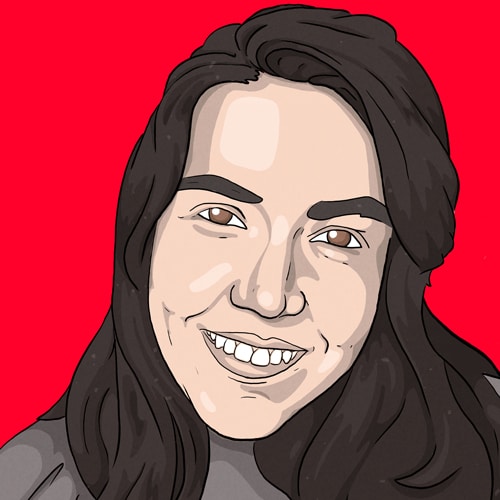
Laura Krasovitzky
Advisor
Me and White Supremacy by Layla F. Saad
When Layla F. Saad began an Instagram challenge called #MeAndWhiteSupremacy, she never predicted it would spread so quickly.
Using a step-by-step reflection process, she encouraged people with white privilege to examine their racist thoughts and behaviors. Thousands of people participated in the challenge, and more than ninety thousand people downloaded the Me and White Supremacy Workbook. Since then, the work has spread to families, book clubs, educational institutions, nonprofits, corporations, event spaces, and more.
Based on the original workbook, “Me and White Supremacy” leads readers through a journey of understanding their white privilege and participation in white supremacy, so that they can stop (often unconsciously) inflicting damage on Black, Indigenous and People of Color, and in turn, help other white people do better, too. The book goes beyond the original workbook by adding more historical and cultural contexts, sharing moving stories and anecdotes, and includes expanded definitions, examples, and further resources.
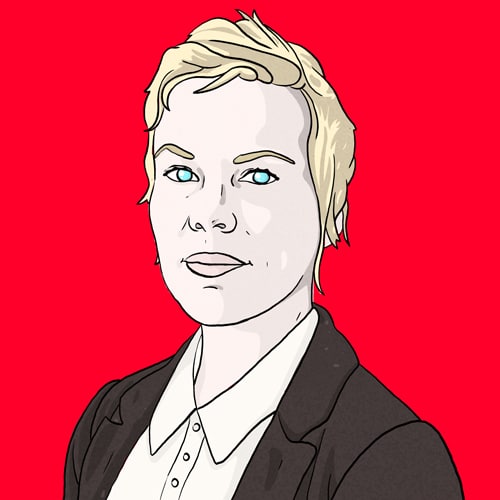
Jae Sevelius
Advisor
#1 Stamped from the Beginning: The Definitive History of Racist Ideas in America by Ibram X. Kendi
#2 How to Do Nothing: Resisting the Attention Economy by Jenny Odell
#3The Water Dancer by Ta-Nehisi Coates
#4 Parable of the Sower by Octavia Butler
#5 Parable of the Talents by Octavia Butler
#6 Pleasure Activism: The Politics of Feeling Good by adrienne maree brown
#7 The Undocumented Americans by Karla Cornejo Villavicencio
Stamped from the Beginning: The Definitive History of Racist Ideas in America by Ibram X. Kendi
In this deeply researched and fast-moving narrative, Kendi chronicles the entire story of anti-black racist ideas and their staggering power over the course of American history. He uses the life stories of five major American intellectuals to drive this history: Puritan minister Cotton Mather, Thomas Jefferson, abolitionist William Lloyd Garrison, W.E.B. Du Bois, and legendary activist Angela Davis.
As Kendi shows, racist ideas did not arise from ignorance or hatred. They were created to justify and rationalize deeply entrenched discriminatory policies and the nation’s racial inequities.
In shedding light on this history, Stamped from the Beginning offers us the tools we need to expose racist thinking. In the process, he gives us reason to hope.
How to Do Nothing: Resisting the Attention Economy by Jenny Odell
In a world where addictive technology is designed to buy and sell our attention, and our value is determined by our 24/7 data productivity, it can seem impossible to escape. But in this inspiring field guide to dropping out of the attention economy, artist and critic Jenny Odell shows us how we can still win back our lives.
Odell sees our attention as the most precious—and overdrawn—resource we have. And we must actively and continuously choose how we use it. We might not spend it on things that capitalism has deemed important … but once we can start paying a new kind of attention, she writes, we can undertake bolder forms of political action, reimagine humankind’s role in the environment, and arrive at more meaningful understandings of happiness and progress.
Far from the simple anti-technology screed, or the back-to-nature meditation we read so often, How to do Nothing is an action plan for thinking outside of capitalist narratives of efficiency and techno-determinism. Provocative, timely, and utterly persuasive, this book will change how you see your place in our world.
The Water Dancer by Ta-Nehisi Coates
This is the dramatic story of an atrocity inflicted on generations of women, men, and children—the violent and capricious separation of families—and the war they waged to simply make lives with the people they loved. Written by one of today’s most exciting thinkers and writers, The Water Dancer is a propulsive, transcendent work that restores the humanity of those from whom everything was stolen.
Parable of the Sower by Octavia Butler
“Parable of the Sower” and “Parable of the Talents” tell the near-future odyssey of Lauren Olamina, a “hyperempathic” young woman who is twice as feeling in a world that has become doubly dehumanized.
Parable of the Talents by Octavia Butler
“Parable of the Sower” and “Parable of the Talents” tell the near-future odyssey of Lauren Olamina, a “hyperempathic” young woman who is twice as feeling in a world that has become doubly dehumanized.
Pleasure Activism: The Politics of Feeling Good by adrienne maree brown
How do we make social justice the most pleasurable human experience? How can we awaken within ourselves desires that make it impossible to settle for anything less than a fulfilling life? Author and editor adrienne maree brown finds the answer in something she calls “pleasure activism,” a politics of healing and happiness that explodes the dour myth that changing the world is just another form of work. Drawing on the black feminist tradition, she challenges us to rethink the ground rules of activism. Her mindset-altering essays are interwoven with conversations and insights from other feminist thinkers, including Audre Lorde, Joan Morgan, Cara Page, Sonya Renee Taylor, and Alexis Pauline Gumbs. Together they cover a wide array of subjects—from sex work to climate change, from race and gender to sex and drugs—building new narratives about how politics can feel good and how what feels good always has a complex politics of its own.
The Undocumented Americans by Karla Cornejo Villavicencio
In her incandescent, relentlessly probing voice, Karla Cornejo Villavicencio combines sensitive reporting and powerful personal narratives to bring to light remarkable stories of resilience, madness, and death. Through these stories we come to understand what it truly means to be a stray. An expendable. A hero. An American.
Transcendent Kingdom by Yaa Gyasi
Gifty is a sixth-year PhD candidate in neuroscience at the Stanford University School of Medicine studying reward-seeking behavior in mice and the neural circuits of depression and addiction. Her brother, Nana, was a gifted high school athlete who died of a heroin overdose after an ankle injury left him hooked on OxyContin. Her suicidal mother is living in her bed. Gifty is determined to discover the scientific basis for the suffering she sees all around her. But even as she turns to the hard sciences to unlock the mystery of her family’s loss, she finds herself hungering for her childhood faith and grappling with the evangelical church in which she was raised, whose promise of salvation remains as tantalizing as it is elusive. Transcendent Kingdom is a deeply moving portrait of a family of Ghanaian immigrants ravaged by depression and addiction and grief–a novel about faith, science, religion, love. Exquisitely written, emotionally searing, this is an exceptionally powerful follow-up to Gyasi’s phenomenal debut.
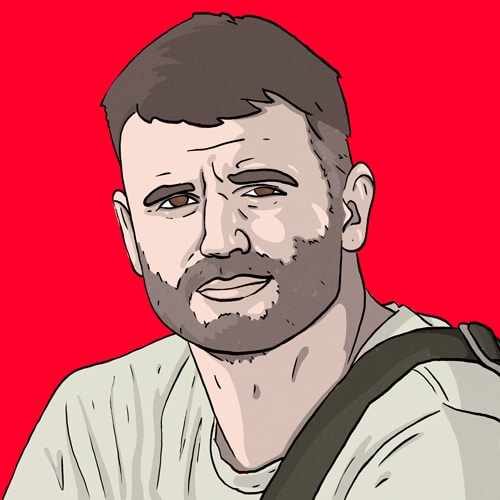
Alexander Zaitchik
Advisor
Less is More: How Degrowth Will Save the World by Jason Hickel
If we want to have a shot at halting the crisis, we need to restore the balance. We need to change how we see nature and our place in it, shifting from a philosophy of domination and extraction to one that’s rooted in reciprocity and regeneration. We need to evolve beyond the dogmas of capitalism to a new system that is fit for the twenty-first century. But what does such a society look like? What about jobs? What about health? What about progress?
This book tackles these questions and traces a clear pathway to a post-capitalist economy. An economy that’s more just, more caring, and more fun. An economy that enables human flourishing while reversing ecological breakdown. An economy that will not only lift us out of our current crisis, but restore our sense of connection to a world that’s brimming with life. By taking less, we can become more.